|
VISIT OUR MASSES and HOMILIES ONLINE! CLICK BELOW TO WATCH
St. Elizabeth of Ravenna Catholic Church
PREPARE BUT DO NOT PREDICT
One could construct a series of possible issues for 2022 and take it to the local bar. The resident expert predicts and so does the drunk. At the end of the year, who was closer to a correct answer? Perhaps it is a toss-up, provided all items were truly unpredictable. Predicting is an uncertain science, as it is a test of our basic interests. Five areas of interest are worth mentioning: the Pandemic, COP27, mid-term elections, the Church Synod and economic conditions at all levels, from local to global.
The pandemic at present has taken four million lives and is still raging at the start of the year -- with new variants possible throughout the world. However, the frightening thing is that the variants seem to slip across national boundaries (with rapid travel conditions) and do not remain contained. Current vaccination procedures are still regarded as the best control measures, and we can only hope more are willing to participate. Through it all, we earnestly ask whether Covid will decline.
The COP27 climate change conference will begin with great expectations, with each of the community of nations listing the measures their country is taking to curb climate change. The world awaits willingness on the part of all to participate and halt the move to a 1.5 degree Celsius rise in global temperature. Will the willingness of these many nations and especially the heavy polluters lead to a global success story?
The Mid-term elections are expected to go against the previous winning party as in times past, but that is uncertain. We await the results and only hope no fraud is committed or blamed when not occurring. Our democracy craves proper elections, whatever the conclusions. Will the best candidates win?
The Church Synod has been unique, in that Pope Francis called on every member of the Church to participate through profound listening and interacting with each other -- and to make insights known to their bishops and beyond. Much depends throughout this year on the degree of participation and openness to listening and speaking. Will the global Synod be successful?
The economic condition, from our local communities all the way to the global system, is the hardest to imagine, for so much depends on supply chains, demands for goods, the prices encountered and the ability of governments to assist in halting the inflation. There are plenty of questions and many anxious consumers who wish for food and fuel price declines. Will these happen?
Each of these five issue areas has their searching questions as to a beneficial outcome. Some may attempt to "yes they will" in an optimistic flare, or "no they won't" with a sense of despair. Nonetheless, we hope realism holds sway. Let's renew our determination to work with each other in bringing about a more wonderful 2022. It can be done if we are willing to collaborate within the human family.

Lake Superior sunrise.
(*photo credit)
January 1, 2022 Viewing 2022 as a Time for Reflection
Why reflections? Because we have this precious time to make our unique impact on a troubled world, and we need to do our utmost to make the greatest benefits possible.
Personally, we need to review our lives and strive to be more meaningful in our prayer life; we ought to live in gratitude, discovering those in need, and helping them whenever we can. Furthermore, we live in communities where enhancement of the social capital is called for. Each of us can contribute by attending to issues of local importance and by supporting community leaders working for these goals. We must trust in God and continue to pray daily. When we have committed misdeeds, we are to confess our faults and thus experience God's forgiveness.
Conservationally, we ought to review our resource expenditures whether in our residences, the foods we eat, or the energy required for comfort and travel. All the while, we must help reduce resource use in innovative ways. A simple lifestyle can easily morph into a more complex one with hardly a thought as to what is occurring, for our pervasive consumer culture can overwhelm us.
Intellectually, we can become complacent in our reading and study habits, allowing ourselves to backslide without quiet time required for growth in intellectual pursuits. Furthermore, we need continued education as an essential part of intellectual life and must practice the self-discipline required. Physically, all of us need exercise, even when weather is harsh and a good excuse seems so enticing. We have to dress warmly to brave the elements and get needed sunlight and fresh air, as well as continue indoor physical fitness exercises.
Regionally, we hear with ever greater frequency that ex-coal miners lack higher-paying opportunities. Changing to new occupations is more difficult for older workers. The pandemic erased a number of good jobs that have not been replaced.
Nationally, we must come to terms with a rising debt and the need to require the payment of fair taxes by the wealthy. A citizen's watchfulness will help ensure that promises and duties are kept by our elected representatives.
Ecclesiastically, we are part of the Body of Christ and need to do more in this year of renewal of faith by spreading Good News, especially to those who have quit going to church.
Globally, we find a troubled world in need of our prayerful attention. Are we concerned about human-caused climate change and how it will impact the poor? Are we aware of conflicts in the Mideast and are we willing to pray for peaceful resolutions?
Prayer to Mary Mother of God: O Mother of all peoples, you know all our sufferings and our hopes. You maternally feel all our struggles between good and evil, between the light and darkness which shake the world. Receive our cry, directed in the Holy Spirit straight to your heart and, with the love of the Mother and Handmaid of the Lord, embrace the individuals and peoples who most look for this embrace, together with the individuals and peoples to whose trust you attend in a particular way. Take the entire human family under your maternal protection. Amen.

Quiet moment of the dove.
(*photo credit)
January 2, 2022 Leading Others to Epiphany
On this feast of Little Christmas, we return to themes of twelve days ago and see once more the celebration of God's gift to us in the Messiah's coming. In this troubled world, many cultivate a sense of confusion and helplessness; they withdraw into themselves and attend to daily cares of fulfilling wants and being mindful about their health and that of loved ones. In some ways, our country and localities suffer equally from similar problems -- a turning in and thus becoming so engrossed in personal physical cares that the broader neighborhood and world is cut off from purview. In such cases self-interest reigns supreme.
Epiphany is God's appearance to us as a helpless infant in a stable. It is a pilgrimage in selflessness. In the simplicity of this momentary event, we pause; we see beyond ourselves; we gaze upon the poor and we adore the Creator of all. This grand appearance moves us out away from self, as it did the wise ones who traveled far to see the infant Jesus. Christmas suddenly becomes more than a local event in Bethlehem to Jewish people; we Gentiles are moved to discover the power of God including us as chosen people. We make following the star of guidance a spiritual event. Spirit as light leads us on our journey of faith to be aware of God's presence in unexpected places and times amid people with whom we share the global Commons.
Let's go to where the Lord is found and sing a hymn of praise. Let's create space in our individual and collective hearts for God to come and be present to us, so that we can become present to others. Let's assist in discovering open space in a troubled world where God can be recognized by all. Materialism has a way of crowding out the Spirit, or at least the utter desire for a Spirit-filled life. Through a new Epiphany we help create a need for the Spirit, not so much through negatively denouncing material things (for we all need material food and lodging as essentials), but by positive acclamation of the need for God in our everyday life.
In our culture, Little Christmas is regarded as secondary to the December 25th Christmas event, but today has a profound theological and spiritual significance for us. In December we focused on the actual coming of the Incarnate One into the world and our simple adoration with shepherds on late Christmas Eve. Little Christmas is the singular act of bringing a broader world to God. We cannot change the entire world, nor has anyone ever succeeded, but we can do one little thing well at a time. Today, we resolve to approach confused folks we will meet this year, and offer them Good News, a guiding insight and light, a cheerful word, a prayer of deliverance. We further resolve to direct people away from the false materialism and greed that so saturate our world, and show them Christ's simple but star-brightening way.
Prayer for Fresh Beginnings: Lord, we begin this year with many ideas on what must be accomplished, even though we are not the custodians of time. Direct us to do the right thing with prudence to realize that only so much can be done well; let us see that success rests with the gifts you have given and not on the over-exertion on our part. While we must plan wisely, help us to do so in your name.

Eastern box turtle, Terrapene carolina.
(*photo credit)
January 3, 2022 Creating Monthly Environmental Themes
Let us designate each month in 2022 with a particular environmental issue as a point of focus and improved awareness. You may decide to rearrange subjects, but here are our chosen topics:
January -- Indoor potted plants deserve special notice. We need to see up close the mystery of living things within our residence and places of work, study, recreation, and worship. This close observation gives us encouragement to continue our domestic routines. Furthermore, indoor plants can remove toxic substances from the immediate indoor environment.
February -- Solar power is this month's theme, because we start to feel the warming rays of the sun in our sun-starved winter world. We know that solar energy is there for the taking, needs to be collected and utilized, and is worthy of celebration. We are like moths attracted by the light.
March -- Wind in breezy March makes us aware of the contrasting destructive power in a tornado and benefits; these range from harnessing wind for human use in many applications from water pumping for irrigation and for livestock, to generating electricity for everyday use in factories, schools and hospitals. Wind is at our disposal, another gift worth our proper investment.
April -- Water splashing upon us in the middle of a shower makes us very aware of this life-giving substance, so essential to our lives. Water is also destructive as a flood or a rising ocean level, and water's lack in drought times is keenly felt as well. When properly harnessed, pure and plentiful water benefits all of us in many ways. Easter water becomes the sign of our baptismal vows and desire to make the world a better place.
May -- Flowers in Mary's month tie us closely to the reawakening Earth. The time of resurrection and expectant Pentecost is one of buds, blossoms, wildflowers, and greening of meadows and lawns; their exhilarating sight and delicate scent sharpens our senses to the fragile nature of all Creation. Jesus is risen and is present in our midst, and so we rise with him. Gardens, God's favorite places, beckon us to full cultivation, and challenge us to intermingle vegetables, herbs, and flowers.
June -- Wildlife fills our life with joy and refreshment. Songbirds and raptors, squirrels and rabbits, butterflies and lightning bugs, all carry a message worth rediscovering in early summer. It is time to detect their presence, protect those that are beneficial, respect and repel those that can bite, and control their breeding places for the good of all. It's time to learn about indigenous wildlife that graces our local vicinity.
Holy Name of Jesus: May we proclaim your name, Jesus, with a reverend bow of head and not in a profane or unthinking manner. Like the early Apostles, help us to see the power in this name, that is above all names and let it be foremost in refreshing a troubled world. May we encourage others to value your name and pronounce it with respect.
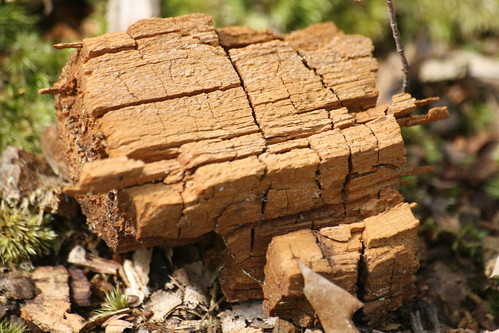
A close-up look at a section of decaying wood.
(*photo credit)
January 4, 2022 Continuing Monthly Environmental Themes
Let us continue our review of monthly issues for 2022:
July -- Community Relations may be better practiced in this month of Independence Day, annual retreats, special festivals, communal celebrations, and family reunions. Does our community and home exude hospitality and welcome strangers?
August -- Land-forms (mountains, deserts, rock formations, valleys, and plains) may be more deeply experienced during vacation time. These undernoticed surroundings give us bearing and direction, and are the record of our place's geological history. The feast of the Transfiguration shows us the "hereness" of the risen Lord and the Assumption speaks of God's invitation for us to be blessed by participating in the act of divine glorification.
September -- Buildings need to be winterized, as scurrying wildlife tell us. Late summer and early fall are the time to attend to checking our residences and places of work for insulation and possible leaks. Besides taking energy conservation measures we ought to compost yard wastes, and prepare for winter gardening.
October -- Trees speak their own sermon in brief autumn's painted landscape. We note their size and type and variety. Trees enhance our lives and provide fruit, wood, climatic modification, wind and sun protection, prevention of soil erosion, and a host of other benefits including their natural beauty. Should not more attention be given to the protection of our forests from pollution and destructive forest harvest practices? Undergrowth needs to be controlled to prevent destructive wildfires.
November -- Food of special types (turkey, cranberries, pumpkin pie, etc.) are part of the American ritualized Thanksgiving meal. Whether we are of rural or urban backgrounds, we are aware of the harvest time ending and the closing of the growing season. We are moved to give thanks for our lives and comforts. We celebrate with the Eucharist -- the heavenly banquet and foretaste of things to come. In receiving this sacrament, we are all the while aware that others suffer from poor nutrition and famine. We are drawn to ask ourselves: Do we tend to eat higher resource intensive foods such as red meat and processed foods? Are we willing to share our bounty with less fortunate people?
December -- Indoors atmosphere is the portion of our environment that is quite critical to quality of life, but often neglected. This is the most unregulated and polluted part of our total environment -- and, with novel home-cleaning products and tighter ventilation controls, air pollution problems grow. In a proper home environment, smoking is forbidden, houseplants purify air, and chemical products are severely limited and controlled.
Saint Elizabeth Ann Seton: Lord, may St. Elizabeth Ann Seton, America's first saint, intercede for our country at this time of crisis. May she be ever mindful of the tremendous needs of our divided nation, and seek grace to help unify warring factions. May we be strengthened in family and religious bonds through her prayers and seek to establish internal peace that is so lacking in America today. May her religious communities thrive as well.
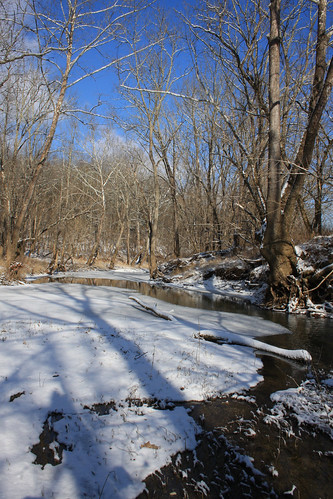
Snowfall on Kentucky stream.
(*photo credit)
January 5, 2022 Observing January Sights
Throughout this year we will include various selections from our book containing Warren Brunner's black-and-white photographs, Appalachian Sensations: A Journey Through the Seasons. We try to catch some of the many daily perceptions from our various senses and discover their differences in various parts of the year. Places, times, and those with whom we are associated add to the pleasing sight, sound, aroma, flavor, and feeling that give quality to our lives and the ready means wherein we can come to ever deeper gratitude. January is less an outdoor month, and so we look for typical winter scenes that can still give joy to a weary heart.
Sparkling Snow-Covered Hillside
God gives an order, divine word flashes to earth:
to spread snow like a blanket, to strew hoarfrost like ashes,
to drop ice like breadcrumbs, and when the cold is unbearable,
God sends word to bring the thaw
and warm wind to melt the snow. (Psalm 147:15-18)
A snow-covered landscape is the Creator's masterpiece, each snowflake a different design, each curved snow drift and bank a work of art. The sight is a jewel to be gazed at from a distance, without daring to step out and disturb the almost perfect landscape. Well, not quite undisturbed, for cottontail's tracks are there and other wildlife will surely follow soon. This fresh blanket of snow is like the cloth placed over the coffin as it is brought to the church, preparing the baptized person for the journey to eternal life.
For a brief moment the world seems perfect. Snow covers over roadcuts, stripped hillsides, and clearcut forestlands. Abused land is removed from sight. The clean covering of a suffering land recalls the divine promise to cleanse us of our faults, to make us pure as new‑fallen snow, and to give us new life. Snowfall in January signifies forgiveness and rebirth. Let us glory in this short‑lived scene, this promise of a New Heaven and New Earth, this Epiphany of God among us.
We may desire to do more than observe. After gearing ourselves for the cold, we can venture outside and feel the air and the energy of a sun-glistening landscape. In fact, we have to admit that the sun is more inviting on a clear winter day than at other seasons of the year. After the outdoor venture we come to appreciate the warmth of interior space all the more.
Prayer for Refugees: Lord Jesus, we reflect on the anger of Herod driving you, Mary and Joseph out of the Holy Land into Egypt. In infancy, you were part of a refugee family with all the concerns that this entails. Your parents did all they could to adjust to these trying circumstances. Today, millions are in similar refugee status; they need our constant prayers and support. May the U.S. and other countries welcome refugees, and make every effort to help return them to better conditions in their homeland. May all our people be sensitive to their needs and never close our minds to their plight.

Blooming indoor geranium, adding floral color to January.
(*photo credit)
January 6, 2022 Expecting Great Things for 2022
Think small and we expect little; think big and we may make substantial gains. Here are some 2022 expectations:
Gratitude is publicly given for Gifts received -- An ungrateful citizenry is intolerable. As a people we need to give public thanks for what God has done, and we must reaffirm our national motto, "In God we trust."
Peace comes to the Middle East -- We enter this year with the clouds of war hanging just below the surface. It calls for bold leadership on the part of governments, which are careful to avoid conflicts and seek avenues for new peace initiatives.
Freedom of religion is ensured in our world -- Even in this country with a tradition of freedom, religious exercise is being threatened in many ways, and these practices are to be exposed. Too often, secularism seems in the ascendancy and must be challenged.
Renewable energy grows in strength -- Wind and solar applications show marvelous growth in the past few years, and we expect these soon to become a major portion of America's total electricity sources -- the best way to curb climate change. At the same time coal is being phased out, natural gas extraction controlled, and the Green New Deal given a lease on life.
Fair taxes are expected by all -- May the U.S. Congress, along with our president come to a workable agreement on fair taxes so that the wealthy will pay their fair share to reduce deficits and launch an infrastructure improvement program that is so needed.
Drug use declines -- It is time to eliminate advertising of legal drugs and to legalize but strictly control marijuana use. May enforcement officers be diligent on what they need to do.
Prisons are reduced in size -- Non-violent criminals ought to be enrolled in work-release programs, so they may live in their own communities and help in supporting their families. Effort must be made to pardon and treat drug offenders.
* Jobs are made available for all -- It may sound odd to some in our current greedy and competitive culture, but it is the government's duty to be the employer of last resort. Infrastructure improvement could open avenues for new and satisfying employment opportunities.
* Health care is properly funded -- Everyone has a right to proper health care; this is not a privilege only for those with wealth. May citizens begin to see the need for a single-payer program that includes all the currently uninsured.
Epiphany Prayer: Show yourself, Jesus, to each of us who are believers. Be close and reveal your presence so we can come and proclaim your name. Make us witnesses of your presence to others, especially the lonely and those who suffer from illness and addictions. May the manifestation of your presence be felt by all!
To Plan or Not to Plan for 2022
January is a quiet month after the holiday season and involves enduring the winter and awaiting the spring growing season. Should we spend some time preparing for the rest of the year as best we can, or should we do what others prefer and live for the day, with no effort about tomorrow or what it will bring? Certainly, it creates less stress for some, especially that the year could include some unforeseen events. But amid it all, there is a possible argument to do some planning (though not excessive); it could be beneficial. God is the owner of time and not us, as the unplanner will note with relish – and we compulsive planners cannot deny it.
Planning does have good qualities, even when results may be different from what we expect. First of all, it says that we have a sense of the future, in which we will participate and to some degree can give our free assent. We do not make the future, but we can add quality and flavor to it by cooperating to the fullest degree possible. As believers, we are convinced that there is an eternal future of which we can participate and which depends to some degree on our freely cooperating with the entire Body of Christ. Planning affirms that commitment to help enhances the future.
Directly related to this participation is our growing sense that in being more perfect we can add to the quality of our collaboration. Each of us as individuals have unique roles to play, depending on our talents and the graces God gives us. We are responsible for what transpires to some degree, and planning can add quality to what we anticipate doing in the service we are called to perform. Planning does more than acknowledge a future; it gives quality to the way we discover and fulfill our role in fashioning that future.
While the plans are not perfect and never anticipate everything, they still make us aware of our humble stance in the service performed. It is an affirmation that I intend to do the best I can, regardless of circumstances. The non-planner can say, “See, you were not perfect in what you expected.” Those who fail to see value in planning are unaware that imperfection can still work to enhance our enthusiasm for an expended job; we trust that God will refashion the unplanned and make good the things that go awry.
We have the opportunity to affirm the almighty hand of God. Plans involve desires to do the right thing, but we are keenly aware that what is truly right is hidden in the recesses of ongoing life. We find the planning to be an expression of hope in what 2022 will bring, of which we will do our best and expect more than what we can ever plan for. Let’s just not overdo or sanctify our plans.
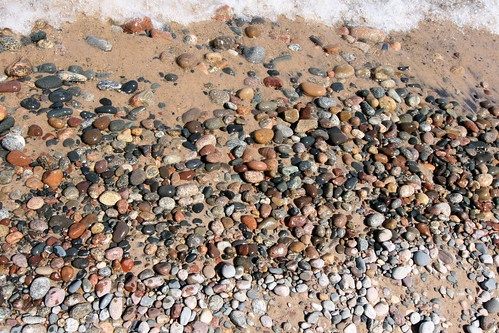
A colorful assortment of weathered pebbles.
(*photo credit)
January 7, 2022 Realizing that a Death Penalty Is Uncivilized
Kentucky's death penalty system is broken. Repeal: fix it permanently! Kentucky Coalition to Abolish the Death Penalty
Human civilization advances in sensitivity to issues such as dealing with crimes and punishment in better ways. In former ages, the civil concern was reducing inhumane types of death penalty (crucifixion or "drawing and quartering"); these involved a form of civic glee associated in administration and spectator-gazing at the scene of execution. We have come a long way in incarceration alternatives as a means of punishment. In fact, most civilized nations with few exceptions (unfortunately China, Iran, and 28 of our states) have abolished the death penalty.
Why are our states (including Kentucky) cast in that uncivilized section of the world? Can't we do better? The states of Alaska, Colorado, Connecticut, Delaware, Hawaii, Illinois, Iowa, Maine, Maryland, Massachusetts, Michigan, Minnesota, New Hampshire, New Jersey, New Mexico, New York, North Dakota, Rhode Island, Vermont, Washington, West Virginia, and Wisconsin have abolished the death penalty. Why not the other 28? We hold that abolition time is also a Right-to- Life issue. One of our county residents has been on death row for a double murder (he says self-defense) of two police officers. The U.S. Supreme Court refused to give a stay of execution over a decade ago. Ralph Baze should have never been condemned to death, and a number of local folks who knew his victims still have advocated abolishing the death penalty.
The Kentucky Assessment Team on the Death Penalty consisting of legal experts found that serious problems persist in state death penalty procedures:
* High error rate in death penalty cases;
* Inadequate retention of evidence;
* Law enforcement inadequately protects against wrongful conviction (false witness identifications and false confessions);
* Inconsistent application of death penalty;
* Juror confusion;
* Low pay for public defenders;
* Unqualified defense attorneys;
* Inadequate protection for the mentally disabled; and
* Lack of date-keeping throughout the administration of the death penalty in Kentucky, making it impossible to guarantee that the system is operating fairly, effectively, and efficiently.
The assessment team made a number of recommendations; however, are these really guarantees that this will make death penalty administration fairer? Justice is not being served for prisoners on death row, certainly not if forced confessions, lack of adequate defense, mental incapacity, or because poverty is involved. Let's stop such practices and advance in being civilized.
Grace for Universal Outlook: Holy Spirit, inspire us to broaden our view, to take on a vision of Christ's presence in all the world; fill us with a deep concern for those who are persecuted in other lands; help prepare China to hear the Good News; guard the believing Africans who live near hostile tribes; make us aware of the destitute who need the essentials now sequestered by the privileged few. Help us see one world in which we can all live in peace and fellowship, a true state of lasting Christlike epiphany.
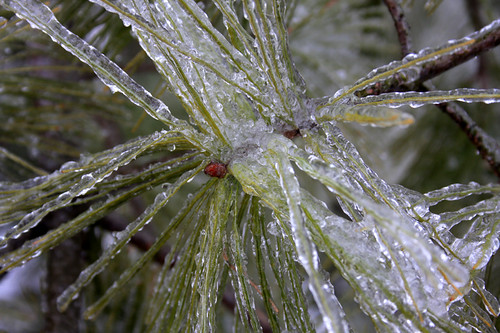
Listen for droplets of melting ice from pine needles.
(*photo credit)
January 8, 2022 Listening to Winter Water Sounds
Even in winter we are aware of water in its many forms: rain, sleet, snow, icicles, ice covered ponds, trickling brooks, waterfalls, and waves at the seashore. Not all of us live where we have access to large bodies of water; it isn't possible for many of us to hear ocean waves crashing on our shores or cascading streams or waterfalls? We make due with limited water sounds -- while our hearing lasts. Winter weather can be violent even when it is not the normal tornado season. Major floods can occur in January, and so can sleet and ice storms. But gentler water sounds are more common in this month: granulated snow/ice hitting the window pane if we are safe at home. Winter rains sound comforting, but can be worrisome for those on the road or impeded in their mobility. But natural gentle sounds of gurgling streams and melting and falling icicles are all music to the ears. So is the crunch made by shoes on the frozen landscape.
January is an indoor month, and water sounds are often experienced by the movement of water within our dwellings. The sounds of a running faucet, a flushing toilet, or a splashing shower are so routine that we are hardly alert to the sounds. What about the noise of a simmering cooking pot, or the hissing of a teakettle, or the clanking of a steam radiator? The season has a way of accentuating water sounds. If these are lacking, how about adding to indoor water music by installing a bubbling system for fish tank or indoor "waterfalls?" Water sounds give quality to our lives -- and spending winter mostly indoors is when life ebbs without positive reinforcement. Perhaps we must go outside to really appreciate winter sounds.
Snow-Sledding Paradise
The squeals of delight are part of the chorus of living beings. The coyote's howl, the ruffed grouse's thumping, and the owl's hoot blend with the excitement voiced by youth at winter play. All creatures praise the Creator through winter sounds unmuffled by summer foliage. Sled riding adds to the chorus of creation: birds and animals seem to be awakening the plants and trees so that sap will soon start to rise. All creation beckons us to listen carefully, for winter sounds spark immense contrast. At times they are unhindered and carry for miles. Then when snow falls a profound silence settles in. Falling and fluffy snow acts as an acoustically sound‑proof space for us to reflect more deeply. We have time to listen, and listen, and listen. God speaks in gentle breezes and even in falling snow. A spiritually‑tuned ear can start to distinguish among nature's winter harmonies.
From: Appalachian Sensations: A Journey through the Seasons.
Prayer for Increasing Insight: Lord, light of the world, we notice the lengthening of daylight and know that the span of darkness is starting to fade. May we take up new reading material and extend our minds to the problems facing our locality and the world around. Furnish us with insight to participate with others in renewing the face of the Earth.

A blue jay (Cyanocitta
cristata) taking cover amidst snowy
branches, a lovely winter scene.
(*photo by Sally Ramsdell)
January 9, 2022 Reaffirming Our Baptismal Vows
God's grace has been revealed, and it has made salvation possible for the whole human race, and taught us that what we have to do is to give up everything that does not lead to God, and all our world ambitions; we must be self-retrained, and live good and religious lives in this present world... (Titus 2:11-12)
Each of us enters the Christian community by taking on vows individually (or by sponsors in the case of infants in anticipation of affirmation when reaching the use of reason). We vow to renounce the allurements of the evil one and to place our minds and hearts on a journey to God. While the goal is clearly before us at our initiation, we are at God's mercy when we falter. Yes, Baptism is a worthy grace-filled -- and vowed -- beginning. It shows the wealth of God's gift and a promised reward when faithful.
The Baptism of Jesus initiates his ministry as a mature care giver; our baptism initiates ours as well. This preamble of our journey of faith anticipates a path of dedication and effort. We become like Christ in his ministry of care for others. "Awaiting" Christ's return involves our activity, encouragement and direction for the wayward, stimulus for the lazy, and support for those who are exhausted and tempted to halt.
The ordinary year is beginning today. It is not of lesser importance than the extraordinary events such as our Baptism. We need events and we need to be faithful to the everyday flow of our lives. Here, "ordinary" means that we are willing to count weeks in a regular sequence (ordinals) starting with this Sunday as number one. All of us crave a certain routine so as to conserve our limited resources -- when we sleep, eat, exercise, work, pray, and relax. We need a regular order and can even become distraught when events disturb the regularity of an internal biological clock.
The extraordinary nature of Baptism startles us. Each Easter when these vows are repeated or at an individual's reception into the Church, we are somewhat shocked at how definitive the vows are. Do we take these baptismal vows seriously? Are we willing to read the Scriptures and discover how Jesus spent his time in his earthly ministry doing good for all? We note that he withdrew to pray and we ask ourselves whether we are prayerful people in these troubled times. We see difficult days ahead and can lose heart.
We must believe that our prayers are heard. The launching forth at Baptism comes with a rush; continuing the vowed life requires an ongoing energy source, namely the sacraments. Awaiting the Lord is our special and fleeting time of preparation. Yes, we have not been perfect, but corrective measures are before us, for the Spirit is our GPS, allowing us to return to the road leading to our promised goal. This is all part of our Baptismal vows.
Baptismal Prayer: Lord Jesus, we celebrate your Baptism by John the Baptist; it is a sign of humility and willingness to join the toils of the human race. We are reminded of our own Baptism, the singular most important event within our mortal life. Through pouring of water and words we became part of your Divine Family, and a member of the Body of Christ. Make us ever more mindful of the sacred privilege we have received.
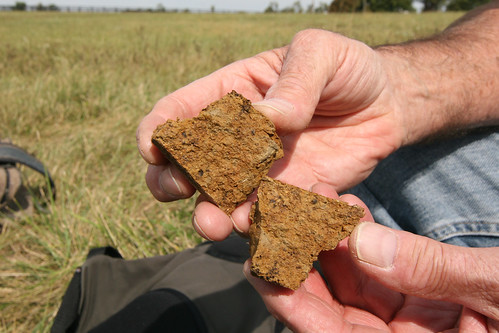
Manganese nodules in lump of clay. Fayette Co., KY.
(*photo credit)
January 10, 2022 Reforming the Academic System
The recent pandemic and curtailment of in-person teaching sessions made many of us wonder about the high cost of higher education and the immense outlay in academic physical structures. Various other issues place modern education at a crossroads:
* growing demand for higher education on part of all;
* escalating educational fees beyond cost-of-living raises;
* growing indebtedness by many students;
* failure to retain teens in schools for lack of concern about traditional education and the dearth of technical training for those who are in need at the high school level;
* inability to find jobs to help repay school debts;
* new alternatives to weak forms of education; and
* a critical review of for-profit institutions.
Now let's add some additional factors that touch even the more legitimate educational institutions:
* professionalization of academic sports at certain places;
* wasteful academic buildings demanding ongoing maintenance;
* high-salaried CEOs running academic institutions;
* sports coaches with seven-figure incomes;
* unqualified athletes in "farm school" settings;
* energy and resource waste in dorms;
* donations by the wealthy who dictate that the critique of the capitalistic system is off-limits for discussion;
* researchers with little desire to teach students;
* ineffective lecture methods carried over from Medieval times when books were scarce and notes had to be copied by hand;
* need for the party card of an academic degree; and
* unions that lock in teachers who may need to be dismissed.
Actually, listing of problems is not sufficient (see next two reflections). First, educational problems need to be subdivided into economic ones related to students, use of academics for non-academic goals, and alternative methods that would compete properly with traditional academics at a higher level. Certainly, elementary education problems differ from higher education ones.
One alternative is for private education to exhibit viable alternatives and especially virtual methods of presentation. Private schools exist through investments as well as donations by charitable individuals and tuition by willing parents and students. In both public and private systems, critics are starting to emerge to attack in-person lecture methods. Taxpayers, parents, and labor unions are more realistic in seeing just demands on teacher quality and compensation. Over-emphasis on sports and resulting physical injury and other abuses are urgent matters. The high price of education is causing all taxpayers to rethink a growing inaccessibility by lower-income folks. It's time for solutions.
Prayer at Dawn: Lord of time, you allow the days to lengthen and sunrise to be a little earlier each day. In your tender compassion, the dawn from on high will break upon us, to shine on those who dwell in darkness and the shadow of death, and to guide our feet in the way of peace. We praise you for eyesight to see the dawn and the energy it takes to carry on this day. We thank you that you have placed us here in times of crisis to be of service. May this dawn renew our spirits for the task ahead.
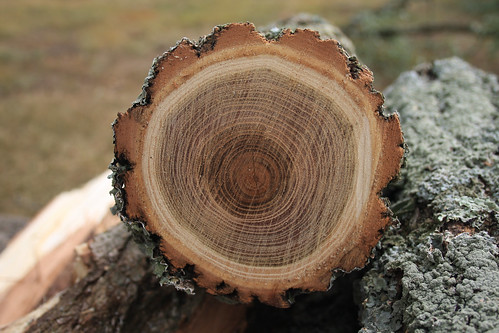
Appreciating wood patterns on cold January day.
(*photo credit)
January 11, 2022 Wondering About Free Higher Education
Lower-income diligent students are being frozen out of the best and even medium-ranking schools due to high-tuition costs; add to this a lack of assurance of jobs while graduates are saddled with huge debts that will take years to repay. The modern system of education is increasingly becoming a privileged preserve of the wealthy with many middle- and lower-class students falling by the wayside. Perhaps the time is right to champion a free university, a dream that can be lost in the for-profit world all around us.
Many in this country speak of the need for a higher education and the eagerness of many for skills in an ever more complex world. Granted, MIT and other institutions offer Internet courses of which upon meeting the requirements, an online student could receive a certificate indicating that the course is passed. The same procedure now occurs among new online university courses given by Internet-based higher education bodies. The question is more one of acceptance and certification of the entire degree program. The pandemic period taught many of the online saving due to reduced travel, lodging, and physical classroom meetings. Why the added expenses? Recorded lectures could be replayed until the student comprehends the material. Note-taking ceases to be the important skill; rather diligence at one's learning pace becomes critical.
A free online university concept works better for certain fields of study over others -- economics, mathematics, sociology, philosophy, history, theology, literature, and many other classroom-oriented fields. Interactive conferences can be achieved as easily by Internet as in a given physical location. Those subjects demanding laboratory work such as language, linguistics, physical sciences, and applied aspects of medicine, law, and social work will require more than formal online lectures. One could reach beyond the Internet: library science could be done in conjunction with libraries, astronomy with observatories, biological sciences with botanical gardens, and on and on. Furthermore, supervised laboratory experience could be obtained for practical arts and sciences through apprenticeship programs paid by governmental grants. Skills learned in laboratory courses could be achieved through technical schools for high school students.
What about the professors needed for free universities? One major source is the older and retired professor pool, who would find it far easier to be taped rather than traveling to a special time and place at an institution. Tuition by recipients may not prove a satisfactory funding source for professional experts who could acquire and dispense expertise as a side project to their own occupation. However, a repayment for government-funded research could include a demand for public service within a free university. Be assured, governmental support is necessary, but the high cost of academic bureaucracy could surely be reduced.
Snowfall Prayer: Lord, we praise you in the near silence of the falling snow. This is all the more true when we are prepared for it -- in the security of a snug dwelling, with plenty of proper winter clothes, fortified with an ample supply of food, water and necessary medicine. Allow us the comfort to enjoy and observe the fluttering flakes, knowing each to be of a different design among the trillions of possibilities. Thank you for a snow covering now beautifying our winter-scarred landscape. Thanks for this moment to listen to the tinkering of snow on the window pane.
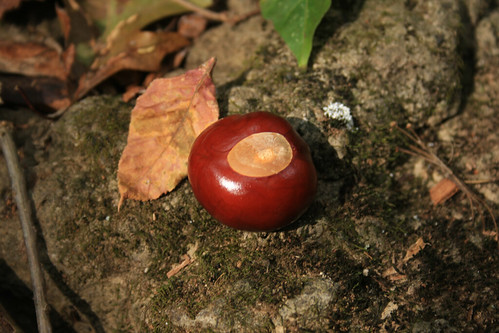
A buckeye (Ohio buckeye, Aesculus glabra), yet undiscovered.
(*photo credit)
January 12, 2022 Keeping Academic Pursuits Simple
If universities cannot be free, at least costs could be cut.
Why pretty campuses and bloated bureaucracies? A sizeable part of tuition is the infrastructure of academic life and all that this entails: massive buildings, academic centers, management offices, grounds management, and on and on. Why such manicured lawns and beautiful buildings? Is it to make donors happy?
Live-at-home students: Institutional living circumstances demand an array of mega-dorms and their maintenance, policing and managing staffs, athletic facilities for free time, extra parking and safety facilities, eating places and abundance of variety for the students, and a host of auxiliary services. These are nice for allowing the youth to get away from home, but they are expensive.
Stop sport recruitment and get serious. In the past decade, large portions of the entire University of Kentucky freshman basketball team moved on to professional sports. Why come to college in the first place? We find the extra expense of stadiums and athletic staffs and high- paid coaches (highest salaries in our state) along with TV rights to ball games and the entire mega-sporting infrastructure as having virtually nothing to do with true education and research.
Divide research from teaching. Very little can be said for some forms of university research that allows the conducting person to receive compensation while supposedly teaching. Often it is the underpaid research assistants who do the teaching, even though they have less experience and must ration time to complete their own work. This is not meant to be an attack on scientific research, but ought it to be done on campuses with inflated lodging and sporting facilities and expensive grounds? Research parks need not be directly situated at universities to still enjoy collaborative research activities. Proximity of the academic place to a research facility is not so important in this interconnected world.
Why classrooms and sleepy students and droning lecturers? The lecture method is outdated and is the outcome of a Medieval university system; then notes could not be transcribed in pre-printing press days and had to be dutifully taken by those who listened to the teacher in a face-to-face situation. However, both the available printed word and the digital word via Internet make all of this lecturing and note-taking out-of-date. A properly arranged set of notes plus a view of the professor on a television screen could be a great savings for all parties in travel time, parking, and assembling in a classroom. Through advanced technologies, classrooms become less and less important -- and ought to be abandoned at the time when teleconferencing and interactive class via Internet are widely practiced.
Mystery Prayer: O Great Source of all Mystery, you inspire us to ask questions and extend our curiosity to broader vistas. You draw us ever closer to yourself, a yearning that we recognize as proof for your presence with us. Never permit a child's wonder to leave us. May unexplored worlds and the "power to ask" become the horizon of our eternal quest. You created the vast world with its deep-cast mysteries, which vividly show your immense power and creativity. By delving into the inner mysteries of the microcosm, we experience your glory in wee things as well. Turn our attention to the mysterious Earth beneath our feet, as well as broad heavens above our heads. May your Mystery enchant us.

Emerging life from the winter forest floor.
(*photo
credit)
January 13, 2022 Donating within a Democracy
Donations are a part of the workings of a democracy. Much of our world of arts, public radio and television, religious institutions, occasional celebrations, private academic centers, environmental groups, health research, libraries and museums, political campaigns (even recent mega-buck rackets), and civic and fraternal organizations are run on donations. Keeping the non-profit world functioning depends on influencing people to give to worthy causes. This key to success is worth treasuring. In fact, the ability to attract the donated gift is the hallmark of a successful director of many projects and programs. However, is this not somewhat overblown through padded expense accounts?
The role of donations must not be overlooked. Through a donation the life of future projects is determined. However, we ought not to expect predetermined and limited success in the hands of those who can afford to donate. When donated funds are guaranteed, this opens the door to lack of ambition and pursuit of greater excellence; when over-competition for limited financial resources occurs, this leads to exaggeration in reporting. The snow storm of donation requests makes us review where we give and whether support for a given cause is important enough to take notice. Let's be critical in what our donated funds achieve.
Charity as service is for all to consider, for charity ought not to be the domain of the wealthy with excess funds. The benefits of a project must include raising the welfare of everyone. Far better is to give of ourselves in whatever way is possible, for the better spiritual civic and political life of the community. Yet we cannot discount the process of attracting donations, for often the cause becomes clarified, the actual working is streamlined, and the benchmark of success is more reasonable through strict accounting. All who receive funds ought to be aware of doing good work, fulfilling promises, reporting honestly, and using resources properly. Being mindful of the intent of donors can be good, or it can be a weapon by "charitable" givers to keep recipients within a particular groove of the status quo.
All should willingly donate for the benefit of others. This is why in-service work for the poor could be part of public education, once a young person is able to serve the needy. If one receives public primary and secondary education, then the maturing recipient should be assigned or help choose an in-service project such as cleaning up the community or assisting the elderly or immobile. This type of in-service donation should become part of every able-bodied citizen, rich or poor; it's an in-kind "taxation" allowing those of less income to give in non-monetary ways. Instead of expecting the rich to give hugh sums, make them pay their surpluses in fair taxes. Still expect everyone to donate.
Planning Prayer: Lord, you give us time in this winter season when activity and momentum slow down, to prepare for the months ahead. In gratitude, we resolve to make this a time of plans, knowing full well that you may insert changes where we least expect. Your Spirit moves us to occupy our allotted time fruitfully. We don't know the future with any certainty, but we can help shape it. May this planning exercise make us more alert as to what we are called to do in being in your service.
TORNADOES AND WEATHER EXTREMES
A month ago here in Kentucky we experienced a series of tornadoes which were uncommon for late autumn. From late Friday the 10th through early Saturday the 11th of December, the weather service was alerting many of our counties about the possibility of tornadoes. Many of us made personal preparations, including hiding my manuscripts in a rather indestructible clothes dryer. And there came the dire warning of a tornado path leading right across the Army chemical depot, a few miles upwind from Ravenna. Amid the constant wail of sirens, media announcements, and phone messages we were by the Grace of God spared in this part of eastern Kentucky; not so for folks living in the western portion of our fair Commonwealth. Mayfield and smaller towns simply were flattened and nearly a hundred deaths, many injuries and immense property damage occurred in the wake of a 200-mile, on-ground tornado, resulting in the largest such extreme weather event in living Kentucky memory. We had never heard of such a tornado before.
Was this agony of destruction an “Act of God” in a legalistic sense, but hardly a theological one? Are humans wholly or partly to blame? Attempting to designate fault with human practices seems the thing to do by those seeking to find human blame. However, the Mississippi Valley and the Great Plains were known to be tornado belts even before the industrial pollutants caused the climate crisis – something that has caught our constant attention for the last decade. Certainly, we have the warning by experts that the frequency of extreme weather events is accelerating, and it seems to be the case. However, to analyze a particular extraordinary event as to what occurred is quite difficult. Better to spend the time developing ways to avoid catastrophes that will continue to occur.
We cannot forget the pictures of the Mayfield candle factory and the inability of the workers to find secure protection when the roof caved in and there was no underground area for safety. In fact, many homes and other structures lack such underground or strong above-ground provisions. However, some people in the belt have done just this, and built structures that could withstand most tornadoes -– but few expect that such extreme weather events will happen to come near them. My father built an underground shelter on our home place, but I’m unsure it was ever used for possible tornado avoidance. Most think the investment is not worth it but, on second thought, the frequency of such events makes it increasingly wise to take the precautions.
Several things are worth considering. Take the announcements of the tornado possibilities seriously; put important papers in a safe place; when the announcements come, put on proper clothes and go to the strongest place possible – and say a prayer for protection. And when it is all clear, help those who suffer if possible with a helping hand or at least by a donation though available sources. We need to share with compassion for survivors, for they really need help rebuilding communities in western Kentucky.

Bear Glacier Panorama / near Stewart, British Columbia, Canada
(*photo
credit)
January 14, 2022 Shrinking Arctic Ice Cap: A Mixed Blessing
We read in history about the immense effort by Europeans such as Henry Hudson and other explorers to find a Northwest passage from Europe to Asia; trading distances could be drastically shortened. With time these hopes focused on traversing frozen islands and inlets of northern Canada; hopes were for a safe and economic route that would bypass routes around Africa, or by using Middle East land and water routes. These European explorers knew such a route could be extremely lucrative for commercial trade. Even a few decades ago dreams were that if the Arctic ice sheet retracts for a period each year, the traffic could flow in half the time and distance "over the top" between Europe and Asia. Such dreams are now becoming reality.
Each year the Arctic ice cap shrinks noticeably in summer. In the summer of 2020, the NASA Scientific Visualization Studio showed a shrinkage of 1.44 million square miles, the second highest loss since modern recording had begun. When one views the Arctic picture of September 15, 2020 it is evident that a wide expand of Canadian and Siberian coastline is open for shipping. Studies show that only a quarter of the ice surviving the summer melting period was over one year old. Due to continued global warming the route over the "top is open" every year for longer shipping periods. It's hard on polar bears, which need ice for travel in hunting their prey, but that is only one ecological problem.
We are aware that a melt cycle always occurs when Earth tilts to the sun in Northern Hemisphere spring and then recedes and freezing restarts in the fall of the year. The melting process exposes more of the dark liquid water that absorbs more light than the reflecting of sunlight by the ice. Thus, a global warming effect is accelerated, and ice reserves of the planet (glaciers and the three-thousand-meter ice sheet of Greenland) melt all the faster. Should that Greenland ice sheet completely melt, oceans would rise seven meters, inundating oceanic island nations and coastal areas where hundreds of millions of the urbanized global population presently live.
Worries extend to Florida where 150 scientists signed a statement of concern because of the ocean rise of eight inches since the turn of the century. For them and many more of us, ramifications of this rise are immense. Climate patterns are definitely changing and these are affecting maritime coastlines. Can the melting rates be reduced or checked through controls on greenhouse gases, especially the release of methane from natural gas drilling and permafrost melting? Curbing carbon dioxide emissions is proceeding, but only too slowly as the fossil fuels are being replaced by renewable energy sources. So, a shorter trade route, but at what an expense to the general environment!
Daylight Prayer: O Creator God, as this month progresses we notice days getting longer -- and we are now aware that another growing season will soon be upon us. Hope springs eternal, and especially when days get longer. At Christmas time we remained confident that darkness would not overcome our world; we now see an affirmation when each day adds about two minutes of light over the previous day. Give us a wider sense of the benefits of daylight and encourage us to help enlighten others.

Rural ruins near the Rockcastle-Pulaski County border, Kentucky
(*photo
credit)
January 15 2022 Treasuring Our Ethnicity
Tomorrow on Religious Freedom Day we reaffirm our citizenship and love of our freedoms in America; we can be proud of our ethnic and religious backgrounds. The U.S. census-taker or population surveyor allows selected recipients to give their first and second ethnic estimations. Some find this worrisome and annoying, even when guaranteed that individual identity of persons will not be available for commercial purposes. Often people respond quickly and may even give slightly different answers as to ethnicity questions if asked later.
The total accumulation of vast amounts of national information makes for a comprehensive picture, which perhaps approximates a true picture by the law of averages. Granted, data collectors can make sampling errors, still most are conscientious and we have a relatively good approximation of an authentic American ethnic picture. Certainly census information from Georgia does not resemble that of Vermont; nor does the Texas ethnic picture resemble that of North Dakota's.
Several decades ago, an account appeared of an Irish-American infant who was raised by an Amish community and became part of it. This is a case of transferring to another ethnic group after birth and could occur through adoption, marriage, or even personal associations. These trans-ethnic occurrences are more common than at first glance. When people marry into another racial or ethnic group, the stronger and more enthusiastic party generally governs the attachment to a particular ethnic group.
We enjoy celebrating with others and thus become a little part of their ethnicity when we partake in their good will and cheer. Is this a "melting pot" effect, or the American acceptance of the stew of ethnic variation? Tolerating diversity makes us more globally centered and breaks down the biases and stereotypes that are often associated with certain groups. In becoming acquainted with diverse ethnic foods, dances, costumes, and celebrations we grow and celebrate the treasures of other cultures.
Ethnic pride fades with groups or through the years and perhaps is replaced by specific "regional" ethnicity. Some people prefer to be called American instead of one or other standard ethnic-rooted categories. These numbers are part of a category that is present in large numbers in Appalachia, the Ozarks, and portions of the Southeast. Is this a lack of ethnic consciousness or an absence of a proper cultural category for response? While "Pennsylvania German" is one such ethnic grouping based in part on land of origin, Ozark or Appalachian people are forming a cultural unity from diverse backgrounds over several generations. Many from these regions declare themselves American, but their number grow more slowly than numbers of Hispanics and Asian Americans.
Prayer to Overcome Racism: We need your help Lord, for the culture in which we are immersed has been riddled with racial undertones that are so hard to detect and face. The story of my place of birth is filled with episodes of slave escape and recapture, of imprisonment and Uncle Tom's sale, of Confederate generals and slave-holding plantations. Give us insight to separate what was good in our past with what needed total purgation; all this takes time and even restitution.
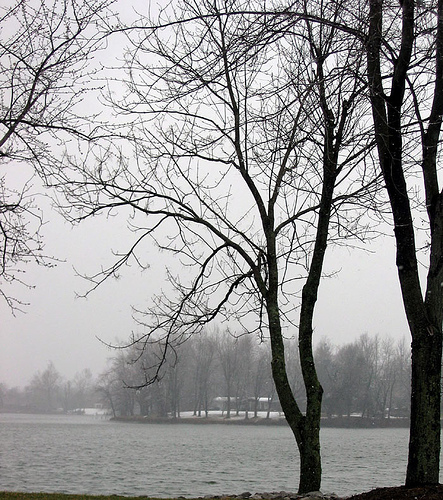
A snowy day, looking across Reservoir #3, Lexington, Kentucky
(*photo
credit)
January 16, 2022 Being Uniquely Called by God
The particular way in which the Spirit is given to each person
is for a good purpose. (I Corinthians 12:7)
Each of us is uniquely made in God's image -- and that has infinite possibility; we share with billions our humanity; however, each of us is unique in the degree and combination of personality, talent, perspectives, and choices. God as source of differences is worthy of celebration. It's great to be ourselves and we can thank God for it! Our uniqueness gives us much more to share as
individuals with others. Our brief moment of life can make the world better, benefit those near us, and give us an honored individuality in eternal glory. Far better to be unique than to fade away within the masses, an advancing army, a crowd yelling in unison, or a singing throng. Yes, the orchestra, band, and choir demand singular contributions and that gives them quality.
We are uniquely fashioned in the patchquilt of God's creation, and those innumerable genes within us include those similar and those uniquely different from the person beside us. We have our particular likes, visions, abilities, dreams, goals, temptations, and calls -- and these go beyond being gene determined. Our free choices are simply unique ones that we render in being accountable as individuals before the divine judgment seat. In one sense, uniqueness indicates the vast array of possible responses; in another sense possible reality is frightening. I have to stand alone before the Lord, and this can be fearsome.
Think of responses by the saints: Thomas More, Mother Teresa, Paul the Apostle, Perpetua, Francis Xavier and on and on. Each has a special gift, a special calling, and a special response of which God's grace was at work throughout. Notable people do not have a monopoly on uniqueness; rather, histories of many go unrecorded beyond the short memories of those close to them. Recall friends and relatives who were very unique in addressing problems or having a sense of trust or sharing for others. Those who utterly fail have had opportunities to make beneficial marks on society.
Our similarities are easier to know than our differences. In being sociable we suppress differences to partake in unified activities -- a successful game, trip, or project. If God creates us as individuals, then part of our respecting and honoring God's handiwork is to encourage others to develop their God-given talents in their own ways. A supporting word is valuable to the young who have talent socializing with their peers and being charitable and of service to others who need their help. People need space to develop; even their teachers all too often regard corrective measures as the extent of entering into another's development. Encourage all to hold their own talents and uniqueness in high regard. We all need to be ourselves.
Cana Wedding Prayer: Lord Jesus, in the third of your epiphany events you hear the plea of your mother. The wedding feast has run out of wine and in confidence she knows you will act. In the glory of your divine power, a miracle occurs and what was water is now changed to the finest wine in great quantity. You launch your public ministry of marvelous deeds for others, and have never ceased through the current actions of the Body of Christ. You show us the example of response to specific needs that confront us, and ensure us that we can be part of favorable solutions.
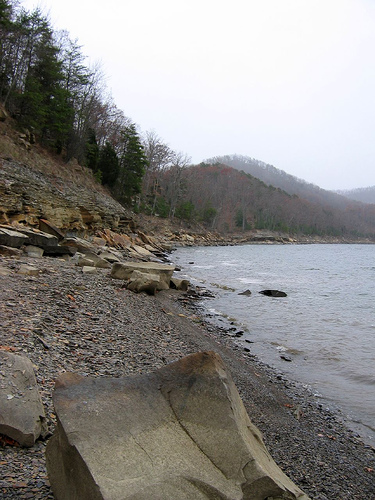
Cave Run Lake, near Morehead, KY
(*photo
credit)
January 17, 2022 Listening to the Wisdom of Ben Franklin
On the birthday of Benjamin Franklin, a statesman and founding father of our country, we need to highlight some of his contributions to our society. Franklin lived at a time when there was perhaps a greater sense of economic opportunity than in recent years of our Republic. He was one of the elders at the framing of the Federal and Pennsylvania Constitutions and spoke with wisdom of the nourishing of democracy of which framers were deliberating. He sought mightily to limit the wealth of individuals, for in his wisdom he realized that a disparity of wealth would poison democratic process -- and yet he was utterly ignored in his suggestions -- others considered it the ranting of an old man.
Democracy involves freedom but not license. Unfortunately, we continue to be overlooked in suggesting Franklin's noble but unsuccessful attempt in the face of an aristocratic group dreaming of wealth and greater material security. Too few citizens then or now listen to the Christian message. Jesus says to forego material wealth for spiritual dimensions and to find here the way to security through profound sharing with others. The greed of uncontrolled wealth in the hands of a few is toxic and will harm a democratic system. Today, with fewer opportunities open, wealth allows the privileged to grab an even greater share of the pot.
Democracy is fragile and easily compromised. Franklin said that the republic is better than a monarchy -- if we can keep it. Our democracy needs to have a vigorous foundation on which people with proper motivation can continue to prosper. Wealth is not wrong when controlled and in the hands of the democratic commons. In an autocratic society, efforts may focus on getting autocrats to be generous. In a democratic society, we must be vigilant and strengthen the workings so that the materialistically-inclined will be controlled by good legislation and regulations.
Wealthy plutocrats will ruin us. The American dream can at times be as immature as a greedy youth wanting all the candy that he or she can grab. The dream needs a realistic dimension and limits to wealth. A laissez faire dream is the wrong approach, for it omits instituting proper controls and overlooks existing regulations. Through monetary power, the wealthy can buy the legislators, attract their attention, and influence the manner in which controls or their lack is fashioned.
Perhaps Franklin realized that the wealthy were exercising excessive power even over the framing of a federal or state constitution -- and they were. If we are to fashion controls for trade and security, then funds would be needed, and those who oversee funds would have a greater influence on government. How can we preserve true democracy? Limits are needed for all material things and that includes money, land, and all forms of wealth.
Prayer for Vocations: Lord of the harvest, inspire those who are being called to be of service to you to find their proper place in the world. Your calls are never only once, even though they could be dramatic on some occasions. As Cardinal Newman says, you give us an ongoing call. Still we, like Samuel, lapse in recognizing your voice. Speak Lord, your servant is listening! Sometimes your voice comes in unusual ways and tones -- even through wounded Earth herself. Make us sensitive to the spiritually tone-deaf in our midst, who cannot distinguish your call from background noise. May we be always attentive.
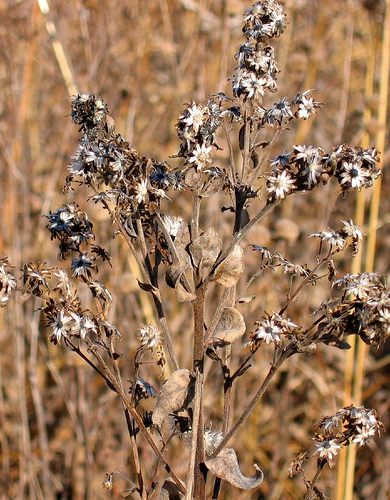
Standing stalk of dried flowers, left over from summer blooms
(*photo
credit)
January 18, 2022 Churches Coming Together Ecumenically
Today is the start of the Unity Octave, a week ahead of the feast of St. Paul's Conversion. During these eight days we pray for and envision unity of all Christians. Is this possible in our age, a coming together of people of various branches of Christian belief to testify to the unity of Christ in our world as part of the Body of Christ? Certainly, faith in God means we see all things are possible with God -- and we believe our sincere prayers are answered. From current disunity we are encouraged to grow towards oneness. We are far more united than divided.
Plan together. Cultural differences led to many of the movements of disunity in the course of human history. We did not understand what other parties meant or the meaning of certain concepts, and this led to misinterpretations and ultimate misunderstanding (Syrian, Greek and Latin differences were examples involving theological and manner of governance issues that hardened over time). Furthermore, grievances caused by political and nationalistic differences fermented divisions that solidified over time and even led to wars. Theological differences caused long-term frictions. Today, reviewing historical divisions in a more neutral and unemotional manner helps us make progress at the table of discussion. Academic research has found common agreement, e.g., the reformation's contentious point of faith and works.
Work together. Shared social goals lead to unity. We can work together even when differing in doctrine, because we all see Christ amid the poor. Through love for all, we come to a common act of dispensing charity. Christians hear Jesus saying that those who do things in his name cannot be opposed but rather welcomed and supported. Being for life in all its forms is a working goal, a reason for rolling up our sleeves together and helping overcome poverty. Let's affirm that we share much common ground.
Think together. In very troubled times the need to be drawn to like-minded people is a great necessity. Energy is lost when two parties allow historical or doctrinal differences to keep them apart. By wishing our divided neighbors Godspeed and to welcome others as brothers and sisters is a step to coming together. We need some brainstorming as to how to share more of what we have in common -- and to wish others well in what they do. The periodical "One" shares stories from Catholic and Orthodox branches.
Pray together. Tolerance practiced through praying together is becoming increasingly common. There are many civic and social occasions when we become one with others through prayers -- but a secular removal of prayer becomes a shared problem among Christians. However, opportunities do arise. We need to be more than polite; we can trust together that our prayers are answered when we find united occasions. Let's find time to pray together.
Prayer to Listen: O God, you spoke to Samuel, but he did not understand. You called again and again, and finally the wise elder Eli told him to announce that he (Samuel) was listening. Inspire all, especially youth, to attend to your voice. May I be another Eli to the Samuels all around, so they can know who calls and how to respond. Help us pause and listen for your voice, and to be willing to alert others as well.
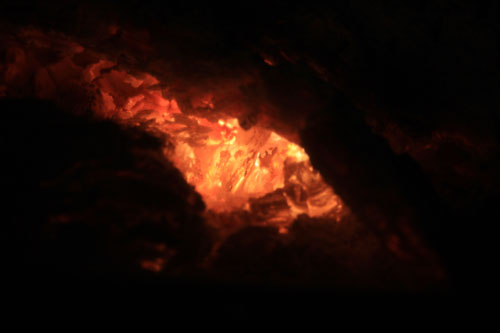
Glowing embers from fireplace.
(*photo credit)
January 19, 2022 Taking in the Aromas of January
In the month of January our senses seem sharper and that applies to smell. In fact, certain aromas trigger our memory to mostly good times and some bad ones from the past. Consider how the aroma of oven-fresh baked goods or freshly-brewed coffee takes us back to Mama's kitchen or the local social gathering place. Note: When my thoughts were first written a decade ago, I had a good sense of smell and taste. In my last few years both have vanished, but my memory allows me to recall them at times.
During this month we will continue to include some of the texts found in our black-and-white photo book, Appalachian Sensations: A Journey through the Seasons. We urge you to obtain a copy on Amazon Books and enjoy contents at leisure.
Curling Wood Smoke from a Cabin
The sons of Aaron must burn this part on the altar,
in addition to the holocaust
on the wood of the fire.
It will be a burnt offering
and its fragrance will appease YHWH.
(Leviticus 3:5)
The cabin smoke means occupancy, wellbeing, good will, and a sense of domestic tranquility. However, smoke elicits an ambivalence, a host of human reactions, some good and some not so. Our ancestors in the faith considered an altar sacrifice with its wood‑fueled oblation as an appeasement or as a thanksgiving offering. Most certainly, is the pungent odor of roasting meat widely liked by hungry people? Did the Almighty make our mouths to water at the aroma of roasting beef?
The scent of wood smoke triggers serious or festive modes depending on circumstances. We all respect fire and our basic attraction stretches back in history; instinctively, we are drawn to fire's sight, sound, odor, and warmth -- for the first human conquest was the capture of fire. A whiff of smoke recalls the creature comforts of a heated place and ample food, or it may set off fire alarms in our brains. A smoking factory chimney has signified employment and, more recently, dangerous air pollution.
Desert Prayer: Lord, you give us dry land as a space with a stark form of natural beauty. You set it off in contrast to wetlands, so that we appreciate the fertile plains with sufficient moisture to grow the foods we need. Help us consider deserts as challenges and a mirror to our spirit, as space that demands renewal and growth in our lives, as areas for solar panels, and as potential for further development. Help us to discover new ways of making deserts far more productive through your grace and our creative efforts.
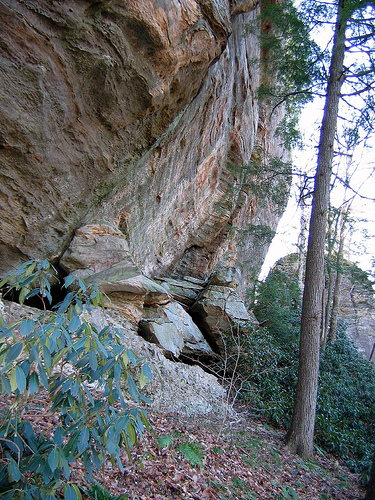
Point of contact: Sandstone over Limestone at Cascade Caverns
(*photo
credit)
January 20, 2022 Respecting Ethnic and Ecological Consciousness
Ethnic awareness is part of environmental awareness -- our homes and community structures, interactions with friends, recreational and educational choices, tolerance for seasonal weather conditions, celebrations and joys, religious worship and ways of conducting and participating in funerals and weddings, and our many interrelationships -- are frequently rooted in ethnicity or in the collective ethnicity of a community. How we solve problems as a democratic people in part depends on the social capital in which we are helping to shape and in which we have invested much of ourselves. The way we practice our democracy and our sense of civility is partly an inherited pattern coming through participation in a democratic community. So is our ecological ethic a part of social capital, namely, the way we treat livestock and wildlife, soil and trees, people and Earth herself.
Ethnicity enters into our current public interest issues and ought not to be neglected, for we all have differences both as individuals and as members of a community. As the ethnic composition changes over time, we could become reactionary and entrenched in our traditional ways, even detesting recent arrivals and their contributing ethnic characteristics. We are members of families with ethnic traits and still are also participants in communities that have absorbed a variety of such traits to allow new ethnic groupings to emerge over time.
When we delve more deeply, we find that merely identifying with a certain ethnic group through answers to a census-questionnaire is not the whole story. We may identify our personal preference as far as subjective knowledge allows for an honest answer, but are unclear as to which portion of a mixed ancestry we ought to declare. One who is non-Germanic in a heavily German community may be willing to be assimilated and join cultural groups so associated, or may wish to express differences by reaffirming one's roots. For many, adherence to ethnic characteristics seem quaint and are not taken seriously; for others this is not the case.
Some regard their ethnicity as personal and do not want to discuss this with others. Others will take pride in telling stories of forebears and heroic efforts in settling, raising their families, service to the country in times of war, and conditions they hold with pride. However, others dismiss ethnicity as unimportant and prefer to blend in without specific notice. Some ask, "Why do you need to know?" Delicate subjects demand proper introductions, and revealing ethnicity is one of these. Recall that some people would not like to uncover family history, or regard their own ignorance as a failing, for not interacting better with parents or grandparents while they were living; for them ethnicity comes with a tinge of remorse, shame or blame. People are concerned about the threatened or endangered, whether plants, animals, languages, or ethnic groups.
Roots Prayer: O Creator Lord, you stir plant roots to start new life in mid-winter; such is the marvel of your creation. You give the spark of life within our being when we are still asleep in this season of repose. Prepare us in the hidden ways for the work you want us to do when more fully awake to needs all about us. Through establishing healthy roots, we too have the nourishment to improve our lives and take on more responsibility.
CELEBRATE WITH ASIAN-AMERICANS
In the midst of winter and after the traditional holiday season, many people search for things to celebrate along with snow and ice. For Filipino Americans who share our faith, one such occasion is the feast of Santo Nino de Atocha. This comes from the Island homeland and involves the infant Jesus statue in colorful attire; this is found in many Catholic homes, much as the Infant of Prague is in European American residences. On the feast day, these statues are brought to church on the third Sunday of January for a special blessing, along with celebrated cuisine and dancing afterwards. In ordinary times, this feast breaks the monotony of the winter months.
Our church at Stanton has a special place for reserving the statue of Santo Nino, and this is carried in procession on the January feast with many of Appalachia’s Filipino Americans and their families jamming the church and grounds for a festive celebration. Our Bishop John Stowe celebrates Mass, blesses the people’s statues and babies, and is willing to be photographed with each family unit; he even speaks some words of Tagalog in his greetings. These have been truly happy occasions, and we hope they resume after the pandemic next year. And the food is wonderful as well!
Certainly, people from the “Orient” have blessed America with their ways of celebrating and inviting others to join. We become acquainted with distinct songs, dance and the rich variety of foods of China, Japan, Thailand, Korea, Vietnam, India and all the parts of the Asian continent and Pacific Ocean regions: these food dishes are most often adapted to local tastes in a hospitable manner. The rapid rise of Asian Americans (from 4.2 % in 2010 to 5.9% in 2020 in national population) is notable in the San Francisco Bay area of California, along with metro Washington DC, Seattle, and northern New Jersey, with Houston and other large cities attracting those for health and education services and for research purposes. However, every state has seen some additions of these folks from Asia and Oceania.
We Americans are a people with a long tradition of welcoming foreigners who come for political or economic reasons. We are aware of the rapid rise in numbers during the 21st century and do not allow past periods of conflict (e.g., incarceration of Japanese Americans during World War II) to hold us back from genuine welcoming today. Yes, these arrivals enhance our land with variety in culture, with diligence and hard work, and with a vast willingness to grow within the democratic spirit of our country. We must not only welcome them, but confront the extremists who show a bias against them, for this land is no place for such attitudes. Variety enriches us all and is worth celebrating.
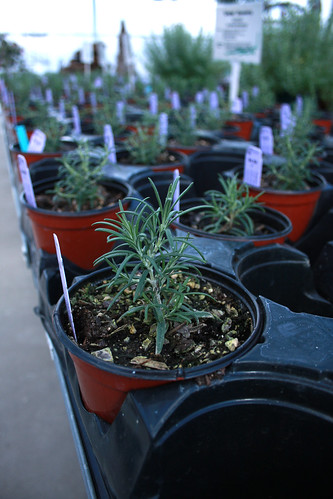
Young herbs, waiting for spring.
(*photo credit)
January 21, 2022 Cultivating Tastes for Future Garden Produce
Let's cultivate our "taste" for gardening and recall that too many begin the garden year too late. My great uncle Louis started making "hotbeds" for his seedlings the day after New Year's. Amid the snow, January is still a good time to start things, including gardens.
Tasteful planning is needed during dreary indoor months when we await the first good day of the growing year. Plan to plant thirty vegetables in 2022. Review which ones did not do well last year and what candidates are good substitutes for this year. Some are worthy of repeating, especially when considering popularity within the household. Additions deserve thoughtful selection, so page through your store of seed catalogs, and also ask advice from green-thumbed neighbors. Use your common sense to help with selection, and include herbs that can spice your dishes.
Tasteful garden design is second only to proper variety selection as a January exercise. Each gardener is challenged as to how much land will be tilled in the spring -- and that depends on whether some of your small or large plot is to be allowed a sabbatical (of which about one-seventh ought to be given rest each year). Perhaps it would be wrong to decide exact locations of some vegetables, for they may prove to be good fillers to interplant in small spaces left over when another crop is unproductive, or will take time to come to maturity. Have creative flexibility.
Tasteful record-keeping seems easy before doing actual work, but it can become burdensome. It's great to keep exact records of yields, but this can get cumbersome, especially when busy work crowds our summer days. Recordings have future value, and so are worth added attention. Comparing yields from year to year also satisfies an experimental fancy and improves gardening choices.
Tasteful winter exercise includes starting seeds indoors such as brassicas for late winter or spring transplanting. Often we can do a little more if the weather is not too severe. Now is the time to obtain wood ash for sprinkling on the garden to add needed minerals, but take care not to over-apply. Spread some manure if the good days allow outdoor work (our climate in winter is milder than that of some readers). When weather permits, cut out weeds from the garden's edge, trim the grapes, and repair the fences.
Tasteful promotion involves encouraging others by a gentle and not oppressive prod to take up gardening and start early. Our promotion of gardening at the local level has a good and fertile field in winter time, when most people crave upcoming spring duties and look for things to do. Remember, on good days this could be a perfect time to begin pruning trees, mend fencing and clean up the landscape.
Prayer for an Ecumenical Spirit: O God, unite us with others who profess your name. Guide us to keep cool in the face of adversity. Make us wiser in choosing issues to address and friends to associate. We are fooled to think our efforts are the only thing, and forget that Christians are actively seeking unity, especially through joint charitable efforts. May we value the various opportunities to communicate with fellow Christians as they continue on their respective journey of faith. Bring those who are distant up close, so that we can speak to each other face-to-face and see the quest for you twinkling in their eyes. May we be open to what lies ahead!
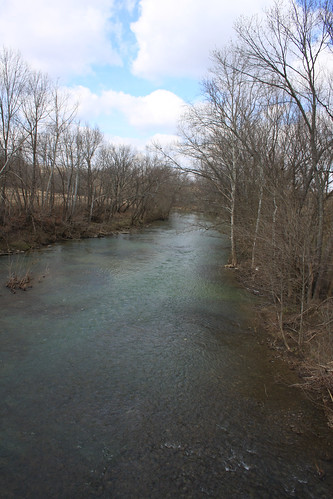
The Chaplin River.
(*photo credit)
January 22, 2022 Critiquing Our Consumer-Based Culture
How sustainable is our lifestyle, our economy, our modern culture? One hears much about a Consumer Confidence Index or the willingness by consumers to spend money on commodities. We can trace such indices month-to-month and throughout the years. Two-thirds of the American economy rests on consumer spending, but ought it to be based on this activity? A meaningful life does not have to be gauged by increased consumption beyond basic needs. We can have a good life by living simply, spending little, growing our own food, building our dwellings, and assisting each other in a community -- and developing a "quality of living" index. We could donate or be taxed on surpluses and thus permit more food and better lodging for people in poorer parts of the world. Wouldn't that be more sustainable and lead to a more stable society?
The first fault of a consumer-based economy is the pressure to go out, loosen purse-strings, and buy unneeded products. This may make jobs for manufacturing, shipping and merchandizing, but could other jobs be of a higher quality, namely servicing people in need, rebuilding the infrastructure, and enhancing the environment? More consumer products mean a drain on limited resources to extract, process, and fashion these into end products. Can our world afford tens of millions of Asians mimicking American consumer excesses?
Americans consume too much; we waste too much; we become materialists because all the goods obtained do not satisfy us, and force many to strive all the harder for more material goods. In fact, the insatiable appetite for goods becomes an addiction. The economy, built on a culture of consumption, crowds out a sensitivity for sharing with others; lack of satisfaction often creates a tension that redoubles the attempt to get more for self.
The consumer-based culture attracts others who lack discipline in the rat race of unfulfilled satisfaction, and the blindness associated with filling individual wants to the detriment of a needy society. The focus becomes one of competition to outdo others, who panic to take more from the limited storeroom; forgotten is a global vision of essential needs by the poor --proper food, affordable housing, basic education and accessible health services. The divergence of some with glutted material goods and others unable to establish a necessary livelihood leads to an unstable global security situation. A selfish secular solution is to use superior military forces to ensure that ill-gotten goods are not damaged or seized by the have-nots of the world. Today the quest for consumer goods by the privileged is truly troubling. Consumer-based economies encourage greed, weaken the structure of our civilization, and cause individuals to seek to imitate those who have a massive store of goods -- all making life truly unsustainable.
Prayer for the Unborn: O Creator God, on this Day of Prayer for the Legal Protection of Unborn Children, give us a sense of the needs of the most helpless ones and their mothers as well. May they be able to come to full term and live happy productive lives. Help us bear responsibility that all unborn will see the light of day in a world that seemingly forgets the precious nature of life itself. Rouse us to our civic duties in a pro-life affirmation and inspire others to join our ranks.
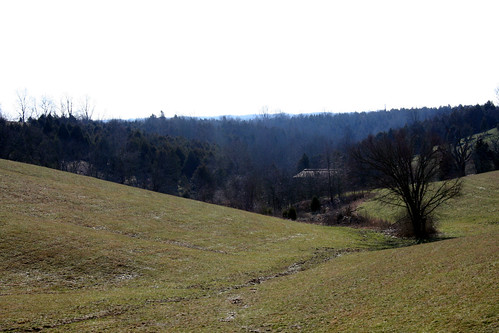
Rural farm scene, Washington Co., KY.
(*photo credit)
January 23, 2022 Needing to Always Seek Reformation
"...to bring good news to the poor, to proclaim liberty to captives, and to the blind new sight, to set the downtrodden free, to proclaim the Lord's year of favor." (Luke 4:18)
The mission is an urgent one, and it takes people who are purified to proclaim it and live it interiorly. We need not be perfect to start the process, for none of us are, but we must commit ourselves to be on the road to perfection. We are to seek reformation as an integral part of our mission to spread the Good News. The more we commit ourselves to striving for perfection, the more we express the urgency that actually exists. Individuals or groups that call for reform and do not have internal examples of reformation as part of their mission can easily succumb to a condition of hypocrisy.
I need interior reform! This is part of the mission of external proclamation. Continually I must undertake self-examination, lest I become proud of my accomplishments and lacking in self-control and proper integrity for the work ahead. My gifts are from God and, while truly gifts, they are to be made better by a constant review and double checking with others who give good advice; the critical ones see things I cannot see myself due to my human blindness. The key to helping others through their blindness is to accept help in overcoming my own. None of us living on Earth have arrived; we are all on a journey of faith.
Churches need constant reform, not to take pride in being already reformed as though blessed with a permanent condition. Churches are called to mission just as much as are individuals. All institutions must discover the God-given grace of undertaking a cleansing process that will freshen and make them more ready for serving others. The words in the quotation above are those that begin the ministry of Jesus. We ought to repeat them as part of our own ministry as well, for the important work initiated by Jesus two millennia ago is not yet complete. We are the Lord's hands, feet, and public mouthpiece.
Urgency includes championing self-denial, simplicity of lifestyle and a conservation ethic. We must come to know our place, our times, and that we cannot do the needed work alone; we are called to collaborate. In all due humility we must join forces with others, for the conditions are such that self-deception is tempting. We single out individuals who are changemakers, the leaders and prophets, but they also are not immune from critical review. A liberating spirit is required; the announcement of Isaiah's words and Jesus' proclamation opens the way to freedom. We help bring this about; we are imperfect clay, but open to becoming better at the task at hand through God's grace.
Grace for Conversion to Social Justice: Lord Jesus, you read to your local Nazareth community the words of Isaiah, that we must bring liberty to captives and glad tidings to the poor. You present yourself as the spokesperson for a message to go out to all the world. You challenge those close to you to acquire a new vision and that renewal starts in the heart. Your words penetrate into our gatherings today, and find us also in need of liberating and anointing those who are oppressed. Lord, you are our model; you are our source; you are our only recourse. The challenge is as great today -- and may we respond with generosity and cooperation.

A great-great grandmother's favorite flower.
(*photo credit)
January 24, 2022 Supporting Bereavement Programs
People are dying every day and deserve our prayers. So do their loved ones who suffer heavily immediately after the passing. Their anguish is often delayed by funeral arrangements and the logistics pertaining to disposal of the remains. Those who are within the community could do well in remembering to assist the families of the deceased at the time of the funeral, but also to be mindful of giving comfort and compassion in the critical weeks and months that follow. Those giving bereavement have to be mindful of anniversaries, birthdays and major holidays, when suffering loved ones and families feel most saddened at their loss. Comfort comes in compassion at the precise moments of renewed grief.
Comforting is an earthhealing exercise -- The act of comforting the sorrowing is an act of mercy, and works to the betterment of the individual and also to the greater society. In fact, in helping to heal one person, a resulting ripple effect goes out to all the world, for just as sin has a social impact, so does a magnetic comforting wave of compassion; in times of losing loved ones, a dose of compassion adds to the quality of human life.
Recognize the Need -- In a busy world with many things togging for our attention, adding comfort beyond the funeral itself is often overlooked. Some communities and parishes have bereavement committees with specialists who remind friends to call and give comport to the bereaved. The need is great because losses of a loved one and readjustment to normal life cries for recognition and addressing. A good committee is quite sensitive when some bereaved suffer more than others and deserve special attention.
Recognize resources -- Some trained people are excellent at doing hospice work or assisting people with depression. They make this a professional occupation, and as experts are certainly deserving of making a livelihood here -- and with proper compensation. They become a resource worth inviting to bring treatment to sufferers. Obviously, some communities with limited financial resources are strapped. One answer is that gifted people who have worked years in human services could take this on as a retiree volunteer program.
Follow through after funerals -- The persons who form the bereavement committee must be reminded that compassion can be a longer-term activity; for some it is needed over a longer period after the loss of a loved one. Some can compensate for the loss and fill their lives with new challenges; others, and this can be husbands upon loving a dear wife, can hurt deeply and yet try to repress any outward sign of loss. Some people have activities or other partners and adjust to a bereavement period better than others, but some suffer intently and even undergo ongoing depression. Arrange extended contact for those most in need.
Prayer for Evangelical Christians: Christ, you give us a oneness through our baptism to become part of your Body. Make us not only aware of the cry for Christian unity, but let us be willing in our actions to care for all who profess faith in you, even when overly zealous. Make them respond with mutual trust and blessing for our works; may we soon join together in one faith and hope. Also protect those Christians who work in hostile fields; may they successfully complete their work.
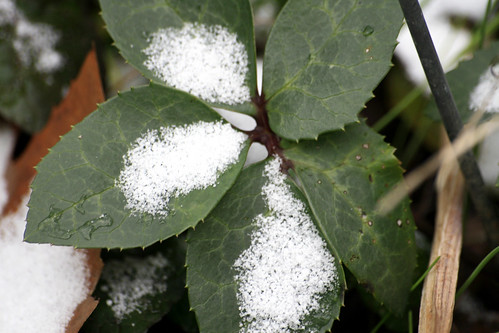
Snow on hardy helebore.
(*photo credit)
January 25, 2022 Confronting Climate Change Denial
On the Feast of the Conversion of St. Paul (when he was struck from a horse), we wonder if such dramatic actions are needed to change our highly competitive and busy culture and to understand impending dangers. Climate change effects seem so obvious to many of us that we forget the presence of deniers (at least to human causation) in our midst. America has a sizeable number of these; these folks do not want to admit mistakes, especially where they personally could have been involved through overuse and waste of resources. Quite often an owner of a gas-hog or a large house and many electronic devices is a prime candidate for denial.
Breaking the climate change denial barrier in creative ways where there is no loser and only winners is a challenge in our hyper-competitive age. Deniers who change their attitudes should be welcomed as winners, when the party realizes that climate change is a personal environmental concern. Welcoming to a growth of consciousness rather than accusations of lingering failures is far superior when it comes to deniers. Here some effort at expressing future catastrophe involving grandchildren may have some effect. A change of heart may demand that certain energy sources (fossil fuel and nuclear) will be phased out and renewable energy sources increased, along with energy efficiency practices. Failure to enter the climate curbing phase will affect everyone, even deniers.
Conservatives are targets of a concerted effort at addressing climate change by those casting doubt on current scientific evidence, namely Big Energy. The goal of those who cast doubts is to continue their transitional use as long as possible in order to maximize profits. The lesson from Big Tobacco is that this extended time can run into decades. However, the case of fossil fuel use is different, for the harm of allowing increased global temperatures through production of more carbon dioxide could prove catastrophic to an entire global population. Extending unhealthy tobacco use affects individual smokers, even though in the millions. The professional merchants of doubt cast seeds of distrust, (e.g., the effects of human action are not proven), saying that citizens ought to defend the profit-making propensity of the privileged few.
The confrontational message to deniers must be straight forward: neglecting climate change is a formula for global disaster. Combined with this is an understanding that renewable energy applications have many advantages, including an improved lifestyle. Such a change will save money, emphasize service-oriented jobs, and reduce extreme weather conditions. All of these extend genuine conservative values, if deniers should pause and consider the consequences. However, converting people away from climate denial can prove to be a real challenge.
Saint Paul, Apostle: Hear us, Saint Paul, on the feast of your conversion. You were struck from your horse and began the most dramatic of conversion experiences. May we see the challenge for dramatic conversion and collaboration among all peoples to curb climate change, granting we have no time to lose. Intercede during this time of crisis that our people see the need for renewal and can spread the word to all who deny and doubt.

Feathers of the Northern Flicker, Colaptes auratus.
(*photo credit)
January 26, 2022 Discussing Negativism without Being Negative
This reflection might prove a challenge, for how can one speak of negativity without being negative? One response is that a small dose of negativity may not be so bad, if it is intermingled with a positive message worth discussing.
Practicing negativity is a no-brainer. Were you ever asked to make comments and found that saying something sounded quite negative? It comes with far less time, words, and thought process than to say something positive. In fact, we are tempted to believe that a wise negative comment shows how much more we know about a given subject than others. The invitation allows a growth in stature by being profoundly negative and even saying how much it is beneath our dignity to go any farther. After a sharp condemnation, we conclude it is not worth our while to say more, for it distracts our ordinary business and takes time to be positive.
We have to confront our personal negativism. Far harder is it to find positive suggestions that would really work in a given situation. This requires that we rid ourselves from an initial judgment that it just won't be successful -- and our duty is to say so in polite ways. There is almost something bureaucratic in discovering a good excuse to move on, and the negative signpost is the best invitation. Positive approaches may invite further reflection, and thus negativity becomes our way of curbing involvement. But is charity fully served?
An optimistic person helps. The best way to guard against negativism is to disassociate oneself from negative people -- and some through personality, financial difficulties, imitation, poor health, or pure depression are in such a situation. They may be in need of our help, but we may desire to keep a certain distance. For the sake of success, we must have a basic optimism that their healing is possible. Thus, to carry on we may need a dose of optimism just prior to a meeting with a known negativist.
Humor breaks the spell. Face it, every person who thought the world was to end tomorrow has been wrong. Is it optimistic to expect it to continue for the next twenty-four hours? Inject a dash of humor and confront the Chicken Littles with a chuckle and a positive comment. You may even succeed in getting them to take their own opinions a little more lightly.
Negativism hinders our work. We can always find fault with others or even with ourselves if we look for it. But revealing faults may be somewhat negative. Look for the good ahead and invite the other person to do likewise. Rather than accentuating the negative, take a positive approach and find benefits in changing a position. The world can be better if we try.
Grace for Power in Weakness: St. Paul, we hear you say that in order not to be conceited you were give a thorn in the flesh; while you begged to be relieved, the Lord replied "My grace is enough for you, for in weakness power reaches perfection." May these words sink in, for we are people pricked by our everyday thorns and we need confidence that God will give us grace to complete our journey of faith. Intercede for us to make this so.

Earthworm, delicately tucked under the wood's bark.
(*photo credit)
January 27, 2022 Concerning Caffeinated and Other Beverages
With the captivating aroma of freshly-brewed coffee we can be motivated to affirm the need for a stimulus on frigid days. Some are tempted to dismiss, amid a drugged culture with many addicts, any discussion of caffeine. Why bother readers with a review of mildly harmful beverages? In response, we affirm that January is hot beverage time; nerves can be jangled by overdoses of caffeine, and even heart-rate changes observed. Still there are claims of health benefits from caffeinated beverages (both tea and coffee), and they are championed by drinkers who have nerves of steel.
Herbal Teas can be alternatives. I grow six types of herbal teas and have an enormous surplus of leaves that can be harvested (and even dried), mainly in late spring and early summer. In fact, growing herbal teas for personal consumption can be a very economic practice, especially for those who spend about 10% of their food budget on drinks. Some herbal teas are so prolific (especially apple mint and chocolate mint) that curbing voluntary growth furnishes plentiful tea supplies. Peppermint tea has no caffeine; spearmint tea suppresses food appetite; pineapple mint tea contains anti-oxidants; Kentucky mint tea is a cool summer drink.
Commercial teas have caffeine to varying degrees, with some Japanese ceremonial teas and black tea from the Assam region of India being consistently high in caffeine. In truth, regular commercial teas have only one-third of the caffeine content of coffee -- but even that may be excessive for some hot beverage fans. Black tea has 40-70 milligrams per 8-ounce serving; green tea has 35-45 milligrams and white tea has 15 to 30 milligrams.
Decaffeinated products can have problems. Decaffeinated teas are commercially available at reasonable prices, but some do not like the taste. In fact, some people prefer to decaffeinate their own favorite teas, but here some of the methods suggested such as 30-second infusion are not as accurate as hearsay might indicate. The half-minute infusion of either the tea bag or loose-leaf tea (pour off this washing and then brew) does not remove 80% of caffeine as was touted, but rather scientific analysis shows it takes six minutes to remove that much -- and one would not want to drink the second cup. Caffeine is also found in cocoa, but fewer regular drinkers exist; however, chocolate-lovers take notice.
Decaffeinated coffee is pricey and yet some brands have satisfactory tastes when favorite caffeine coffees must be abandoned. However, this requires acquiring new tastes and not overusing God's gifts to us, for we are all to be moderate in all practices. Some decaffeinated coffees have small residual amounts of chemical agents and these might become harmful with repeated ingestion. Trace amounts can add up for coffee drinkers -- though freeze-dried procedures are promising.
Naked Forest Prayer: O Creator God, you made the forest community thrive in natural ways. During winter this community sleeps and does not have the buds of spring, foliage of summer, and colored leaves of autumn. However, you give it beauty in the exposed shapes and curves of tree sizes and branches. Here, when we enter and spend time in the silence of seasonal arbors, we discover a rare beauty hidden in summer foliage. Thank you, Lord, for allowing us to appreciate what so many miss in the hustle-bustle world around us. May we admire winter forest beauty.
BEING JOYFUL IN SERIOUS TIMES
As the pandemic concludes its second year with no full end in sight, some would regard the challenge to staying joyful through it all as mere pretending. But must it be? We need to be genuinely joyful in order to preserve our humanity and to offer encouragement to a suffering community with many buried in their woes and discomforts. Joy is more than an aspiration, or the domain of a select few. We are all candidates for an atmosphere of joy and one that is more than temporary. Didn’t St. Paul say to always be joyful, and he wrote this from a horrible prison with no release in sight. “Rejoice in the Lord always.” I will say it again: rejoice!
As believers in the future, we know things will improve, and so we continue to cultivate a spirit of joy for our own wellbeing and for the sake of relatives, neighbors and others with whom we associate. Yes, we can be joyful in a general prevailing atmosphere, even when we endure suffering or show compassion for others. Joy amidst the hard knocks of this world! For believers in Christ, we find that joy can be a yearning, a promise, a foreshadowing, and an imitation of Christ who experienced divine joy while still suffering and dying for us. Joy is more than a short-term feeling of pleasure at a joke well told, or the moment we meet a friend we haven’t seen in years. If the times are challenging, there are ways to maintain joy and improve it, for it takes effort.
Maintenance comes with avoiding attitudes that can dampen joy. We have to forgive those who harm us and refuse to hold grudges, or else the shadow of dislike permeates our whole being. And this involves forgiving ourselves as well. Furthermore, we must not allow grievances we have had to take hold and fester within us. We cannot feel sorry for ourselves, or become so small as to cut down others who are being honored or appreciated. Let’s never belittle others, for in shaving them down we are undercutting ourselves and dampening any fragment of joy. Certainly, a permanent state of despair allows no place, for joy can only endure where there is hope. Nor can we feel sorry for ourselves for not achieving some previous goal. We need to be humble enough to know who we are and thank God for it. Such an attitude is seen easily by others who enjoy our joy.
Elements that help us improve our joy include the opposite of the ones just listed: forgiving others and ourselves and enhancing the good things said of another with added contributions. Yes, we can look to the horizon, since being believers in the future we know that an eternity can be a happy one with the Lord. Our current connection with divinity gives us the wherewithal to withstand harsh conditions and short-term aches and sufferings. Things will get better and relishing that belief fills in the crevices of pain and gives that environment an energized boost. Smile, we need more joy right now.
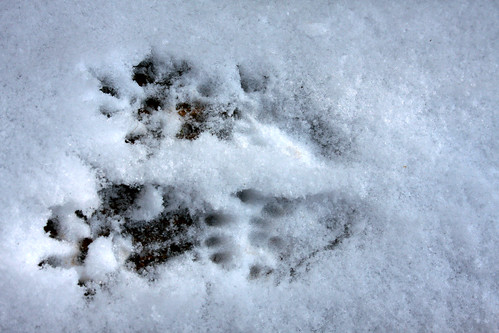
Following the racoon.
(*photo credit)
January 28, 2022 Tracking Footprints in the Snow
In January we occasionally venture outdoors and find we are not alone. The wintering wildlife is not all hibernating. An art of tracking these hearty residents of the woods is well worth becoming acquainted. I can identify deer, rabbit, and a few other hoof and paw prints, but naturalists can tell much by the tracks in mud, sand, or snow. It is impressive how much can be learned by how these creatures touch the Earth in a moment of their passing. Touching Earth appeals to us because we are temporary travelers and must travel lightly. The snow cover is a temporary record of this journey. In one sense we are discomforted that the first trail blazers got there ahead of us and disturbed the tranquil snow scene, but then why shouldn't they? It is their land also.
Once again, we mention our available photo book, Appalachian Sensations: A Journey through the Seasons. The portion that deals with touch and feeling is very important at all seasons, but especially with snow cover. I recall seminary students who came from tropical lands and saw snow for the first time. Their joy was childlike, and very soon they discovered that snow is cold and, when melted, wet -- and so they had to be properly geared. To touch winter's delights means preparing oneself for the outdoors.
January --Playing in the Snow
How beautiful on the mountains,
are the feet of one who brings good news,
who heralds peace, brings happiness,
proclaims salvation, and tells Zion,
"Your God is King!" (Isaiah 52:7)
Our footprints are part of our bonding with our mountains. But footprints need to be gingerly made, not creating a lasting imprint. Rather, footprints are expected to fade quickly. Our bare feet are more sensitive to the soil than shod feet. We know the land's roughness or softness, its warmth or coldness. I remember the warm cow paths weaving through the ragweed patches in the sunlit meadow in late summer; I remember the sharp cold November grass when I walked barefoot as late as possible.
Making footprints creates an unforgettable sensation, a closeness to Earth. They add beauty to the mountains, for they celebrate the dedication of those who bring Good News. It is better that our mountains feel the footprints of people present than that they be depopulated and lacking them. Nature is best when glorified, touched by human presence, and bearing the imprint of our feet. In turn, our presence should include lightly trod footprints, not the heavy-footed tracks of bulldozers and massive earth‑moving equipment. May we respect the delicate land on which we tread!
Gloria: Lord Jesus, Only Begotten Son, Lord God, Lamb of God, Son of the Father, you take away the sins of the world, have mercy on us; you take away the sins of the world, receive our prayer; you are seated at the right hand of the Father, have mercy on us. For you alone are the Holy One, you alone are the Lord, you alone are the most high, Jesus Christ, with the Holy Spirit in the glory of God the Father. Amen.
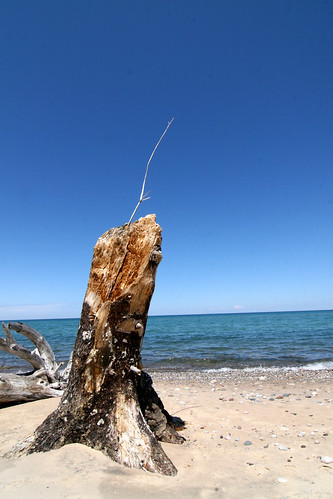
Gentle waves against blue sky.
(*photo credit)
January 29, 2022 Promoting Renewables: Tidal Energy
During this year we will mention various renewable energy sources that could help give our nation energy independence without resorting to more oil, gas, and coal extraction and use. We suggest solar, wind, geothermal, biofuels, and varieties of hydropower such as currents from impounded lakes and flowing rivers, as well as the waves and the tides. In some of these sources, the initial capital outlay could be met by private sources along with being a sound investment of our government, with loans repaid over time. Tidal energy is one of these with advantages:
* Recognized energy source -- The ancient and Medieval maritime states used versions of this source to generate the power needed to turn the mills of those periods. Tide mills have a long modern history in Europe and North America, and in the last century they became a source of electricity generation. New design and turbine technologies make this method even more efficient and able to be used in less pronounced tidal areas. Recent tidal steam generators make this source increasingly competitive as well.
* Proven technology -- The Rance Tidal Power Station on the Rance River in Brittany (France) has been operating successfully since 1966 and has a peak rating of 240 megawatts. The Bay of Fundy (Canada) experiences the highest tides in the world and could be ideal for utilizing new tidal steam technologies.
* Predictability of tides -- We could say as long as the moon influences our bodies of water, tides will come in and out on a predicted schedule. Tides, unlike solar affected by cloud cover, hydropower affected by lake levels, and winds that blow as they please, have little that can obstruct them -- except if increased suddenly by an extremely rare tsunami.
* Non-polluting -- This characteristic is shared by other renewables, but even to a greater degree since it does not require precious land resources for installment as does solar energy. It only needs land-based transmission networks (already partly in place) to get tidal electricity to consumers.
* Unobstructive -- This source lacks what some regard as unpleasant sound effects of wind generators, only the rhythmic whisper of the coming and going of tides. It is less visibly noticeable than seashore wind farms and has harmful effects to wildlife in air or land.
* Sources near population concentrations -- Tidal power could be harvested at various points of the two-dozen ocean and gulf coastline U.S. states and seven Great Lake states. Over one-third of America's population is within one hour's drive of coastlines.
* High potential -- The U.S. Department of Energy estimates that electric generation from tidal and wave sources on shorelines could potentially supply one-third of our electricity needs. Investments, though initially sizeable, have the potential for beneficial payback during the installation's lifetime.
Prayer: Lord of the waves, allow us to gain practical utility of the tides that have mesmerized your creatures for generations. Let the tides of Earth now be of still greater benefit.
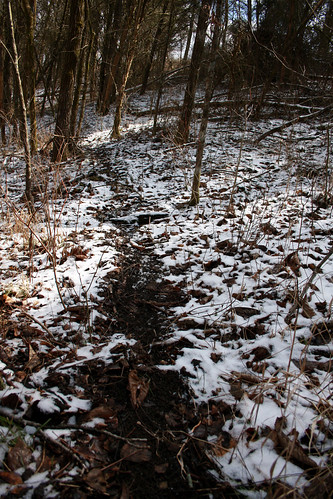
Light snow in the forest.
(*photo credit)
January 30, 2022 Speaking the Prophetic Truth
I tell you solemnly, no prophet is ever accepted in his own country.
(Luke 4:24)
In today's Gospel passage, Jesus launches his public ministry by speaking plainly and forthrightly about his universal message. It is a challenging undertaking, for it occurs in his hometown and his message is received with mixed emotions. In telling about the universality of his concerns, and quoting from Scripture to do so, Jesus triggers rage on the part of hometown acquaintances. Some issues seem beyond the pale of political correctness, but ought they? Several inconvenient truths require public expression today:
1. Climate change is of human causation and needs to be immediately addressed by all. Even if this causes the rupture of a delicate balance at a community level by some who cannot dare to accept this truth, still we need to change our lifestyles at the personal and higher levels and do so NOW. Part of the immediate change needed is to change to renewable energy sources.
2. The globalized capitalistic economy is utterly unsustainable; it must be changed though this is a slow process, for what will ultimately emerge is currently unknown. The time for tweaking and modifications is long past by both privileged wealthy nations and individuals; a nightmare is emerging called fiscal gridlock. The wealthy, whether nations or individuals, must share the immense resources they have sequestered with those who need the essentials of life: nutritious food, clean drinking water, adequate housing, quality education, and access to health facilities. Unfortunately, those in favor of redistribution, especially through fairer taxation, will expect severe limits on implementation because of "hometown" rage and opposition.
3. Religious freedom always deserves protection. This message is generally more difficult for those who accept the first statement totally and the second with some degree of qualification. Social issues often clash violently during the current cultural wars over same-sex marriage and abortion. Here the freedom of individuals, communities, and institutions to practice what is ethically important requires defense. No one ought to be bound to follow rules that they regard as immoral -- and they have a perfect right to help render them inoperative. The first American Revolution was triggered by being upset with lack of freedom. Let us never forget things are worth fighting for in this age as well.
4. Guns or at least their ammunition must be controlled. The ban on automatic weapons needs to be reimposed and enforced. We are in a land sprinkled with crazies who regard it their right to bear arms and have a cache of ammo to use at will. The right to bear arms needs to be a civic and community duty as it was in 1775.
Prayer: Lord, teach us to listen to the Holy Spirit and, even when truths seem hard to express, help us do so at whatever cost.
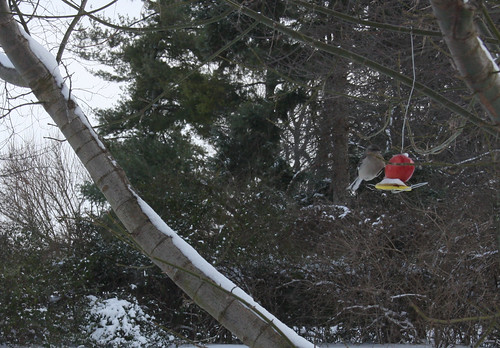
Mockingbird finds comfort in apple meal.
(*photo credit)
January 31, 2022 Challenging the "Right to Die"
Today is Backward Day -- whatever that means. For some of us the discussion of the "Right to Die" may fit that title. A while back I heard a discussion of the "Right to Die," or physician-assisted suicide, that was on the November ballot in Massachusetts (and lost). Guest speakers debated on NPR's "On Point" program. The discussion seemed skewed in favor of the existing Oregon law that has permitted assisted deaths since 1997. From the pro-choice speakers the practice sounded balanced, rare, and relieving for the terminally ill. A single opponent was given a short response time.
The opposition to "right to die" raises the real possibility that profit-making insurance companies and certain outside parties would attempt to hasten deaths, because it only costs $300 to administer barbiturate doses for the mentally competent as opposed to months of costly treatment as the terminally ill await death. One volunteer caller spoke of that outside pressure in the case of his youthful son who really wanted to live. Would this option of quicker termination be "suggested" to the person who is under enough pain and fear to fashion a sound judgment? And will more states put such options into law as a pro-choice issue?
One startling statistic in the problem was that only a few took the necessary mental evaluation of their terminal condition in Oregon, where it seemed to be required. Quality of life is improved with effort, and people are helped in every way possible. Were many of those depressed given an easy option for suicide, when they could have received quality hospice, palliative care, and spiritual assistance in their current state?
The battle will go on and the possibility of abuse will be present. Certainly, someone does not have to prolong life with forced feeding or other drastic means beyond ordinary treatment. We are to be prepared to die; extensive and costly methods of prolonging life do not have to be undertaken, which in themselves reduce one's quality of life. But extending care as a route to assisted suicide is a tragic option. Many of us have signed that we don't desire unusual extensive procedures for we're poor folks.
Spiritual assistance can improve dying with dignity. Even in dying we can have a quality of life quite worthwhile, if we offer up our own sufferings to the Lord for the good of others. This offering can then become a precious lode of grace-laden help to those near and far. To suffer with others, and with the Lord at the appointed time for us, is to live a high quality of life even in dying. We do not have to undergo suffering that can be easily relieved by good palliative care, but a "right to die" option is frightening and fraught with abuse.
Prayer: Lord show us what it means to choose to die by offering our sufferings for the good of others, a choice that contains a deep sense of dignity in our final days. |